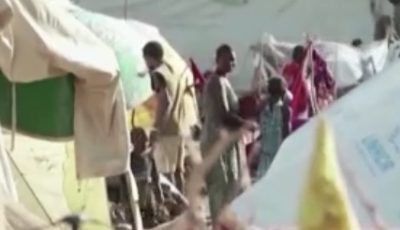Malnutrition Deaths in Kordofan in Sudan (SAF, RSF, and Darfur)
Kanako Mita, Sawako Utsumi, and Lee Jay Walker
Modern Tokyo Times

The war in Sudan continues unabated, creating a fractured nation effectively split between two competing centres of power. On one side is the Rapid Support Forces (RSF) and its allies, implicated in appalling atrocities against non-Arab communities in several regions. On the other stands the Sudanese Armed Forces (SAF), which the United Arab Emirates accuses of harboring pro–Muslim Brotherhood sympathies.
During a previous fact-finding mission, expert Mona Rishwami concluded that both the RSF and the SAF have perpetrated grave violations against the civilian population. Compounding this, millions of people now face acute food insecurity, with the worst-case scenario pointing toward widespread starvation. Reports of more than two dozen children dying from malnutrition-related causes in the Kordofan region, alongside the catastrophic conditions in Darfur, underscore the dire reality confronting civilians.
In the Kordofan region alone, at least 23 children have died from starvation over the past month. Simultaneously, massacres targeting non-Arab communities persist in Darfur, while both the RSF and the SAF continue to carry out executions of captured fighters. These are profoundly bleak days for the people of Sudan.
AP News reports, “Kadugli, the capital of South Kordofan province, is where famine was declared earlier this month by the Integrated Food Security Phase Classification. The RSF has besieged Kadugli town for months, with tens of thousands of people trapped as the group tries to seize more territory from the Sudanese military.”
UN News reports, “The IPC’s Famine Review Committee (FRC) found that famine conditions are occurring in El Fasher, capital of North Darfur state, and Kadugli in South Kordofan, which have been largely cut off due to conflict.”
Also, UN agencies stipulated that similar conditions in Dilling, South Kordofan, “are likely similar to Kadugli, but cannot be classified due to insufficient reliable data – a result of restricted humanitarian access and ongoing hostilities.”
According to the FRC, a further twenty areas across Greater Darfur and Greater Kordofan are now hovering on the brink of famine. These zones include remote rural localities cut off from aid, displacement camps buckling under impossible pressure, and newly identified hotspots in East Darfur and South Kordofan. The warning is stark: entire communities already living on the margins are sliding toward catastrophe, with little capacity left to absorb another shock.
In other parts of the country, the RSF and allied Arab militias recently broke the siege of El Fasher (Al-Fashir) in Darfur—an event immediately followed by widespread reports of massacres. With an estimated 40% of young children in the city already suffering from acute malnutrition, the fall of the city threatens an even deeper humanitarian collapse. The future of El Fasher, already hanging by a thread, now darkens further.
Darfur first seared itself into the global conscience during the 2003–2005 conflict, when Arab militias were accused of orchestrating ruthless campaigns of ethnic cleansing against Black African communities—including the Fur, Masalit, and Zaghawa—resulting in hundreds of thousands of deaths. Today, the region once again descends into brutality. Since the outbreak of the current war, ethnically driven attacks have returned with chilling familiarity, once more targeting Black African populations across Darfur.
Famine conditions have gripped El Fasher since August of last year, while other regions—such as Kordofan—continue to deteriorate. Yet unlike crises in Gaza or the war between the Russian Federation and Ukraine, the catastrophic humanitarian emergencies unfolding in the Democratic Republic of Congo, Ethiopia, Myanmar, Sudan, Yemen, and elsewhere rarely command sustained global attention. In many cases, they are overshadowed by geopolitical narratives, or diluted by selective, sanitized, or politically charged language that obscures the full scale of suffering—while disproportionately demonizing Israel and the Russian Federation.
These parallel tragedies reveal a stark truth: some humanitarian catastrophes dominate headlines, while others—no less devastating—are allowed to fade into the margins of global concern.
Catherine Russell (the Executive Director of UNICEF – actively involved in highlighting the crisis in Sudan) said, “Children as young as one being raped by armed men should shock anyone to their core and compel immediate action… Millions of children in Sudan are at risk of rape and other forms of sexual violence, which is being used as a tactic of war. This is an abhorrent violation of international law and could constitute a war crime. It must stop.”
South Sudan ultimately broke away from Sudan after decades of brutal conflict in which millions of non-Arab ethnic groups were killed. During this long and violent period, Arab Muslim militias also engaged in slave raids and enslavement practices targeting non-Arab peoples, including the Dinka.
Today, the renewed fighting in Sudan raises the specter of history repeating itself. The country risks sliding toward a de facto partition—mirroring the rival administrations seen in Libya—even if Sudan’s formal territorial integrity remains intact.
It is imperative that regional states, Gulf powers, and the wider international community prioritize stability in Sudan and work decisively to bring the rival factions to the negotiating table. Without a sustained and enforceable peace agreement, the country will continue its downward spiral—marked by ethnic massacres, widespread malnutrition, and a host of other brutal realities that are now defining daily life for millions. Sudan cannot endure further fragmentation; the cost of inaction will be measured in lives lost and communities erased.

Modern Tokyo News is part of the Modern Tokyo Times group
http://moderntokyotimes.com Modern Tokyo Times – International News and Japan News
http://sawakoart.com – Sawako Utsumi and her website – Modern Tokyo Times artist
https://moderntokyonews.com Modern Tokyo News – Tokyo News and International News
PLEASE JOIN ON TWITTER
https://twitter.com/MTT_News Modern Tokyo Times
PLEASE JOIN ON FACEBOOK